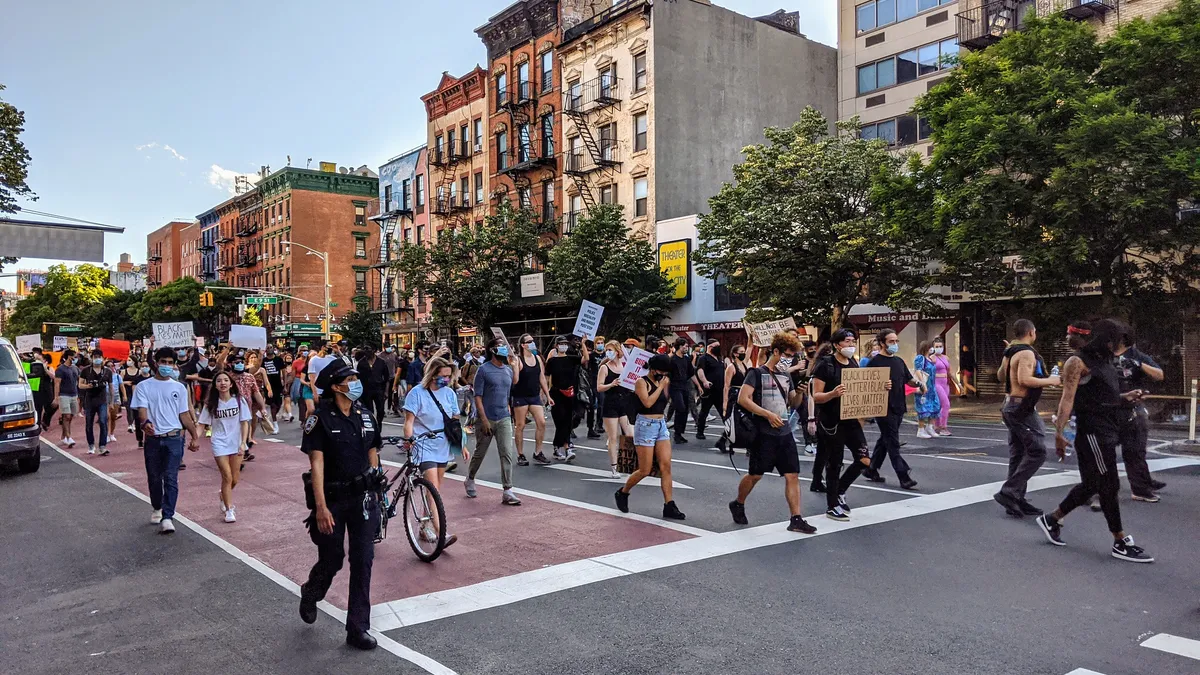Michael Ware, an independent reefer driver for 23 years, sees a problem with the trucking industry when he goes to trade shows.
The private trucks displayed are very expensive, very tricked out — and all owned by white drivers. Ware, the founder of the Facebook group Black Truckers United, wonders if Black drivers are getting the same financing as white drivers, the latter of whom make up about 77% of long-haul drivers, according to Ellen Voie, president of the Women in Trucking Association, citing a survey of 900 long-haul carriers done in September 2019.
Networking, training and hiring are also dominated by white workers, and Black drivers are often passed over for jobs, information and more, Ware told Transport Dive. Racial slurs are often aimed at Black drivers via the CB radio, he said.
Frustrated, Ware founded the Facebook group in 2014 to counter what he calls the "good ol' boy" network within the U.S. trucking sector.
Networking is vital, Ware said, and it seemed Black drivers were getting left out of discussions among independent drivers about jobs, good routes and more. The Facebook page has helped Black drivers "learn about driving the right way," teaching drivers the ins and outs of the industry beyond steering and braking, Ware said.
"It's not going to change right away. It's changing slowly."

Michael Ware
Founder, Black Truckers United
But Ware knows things won't get better overnight.
"It's not going to change right away," said Ware. "It's changing slowly."
Fleets react, on social media and elsewhere
Following the killing of George Floyd on May 25, the nation reassessed its values. Corporations began to assess what impact racism, systemic or otherwise, has on company culture.
Some fleets and OEMs made statements denouncing racism and brutality. UPS endorsed an antilynching law, and pledged support to civil rights groups. It was not the typical social media post that the UPS public affairs account makes. Over a few weeks, UPS Public Affairs has tweeted about grants, small businesses, COVID-19, trade and women-run businesses.
The nation has in the past deferred to states on most murder cases. But the proposed bill, H.R. 35, was introduced by Rep. Bobby Rush to combat lynching, defined by Merriam-Webster as "to put to death (as by hanging) by mob action without legal approval or permission." Lynching was often done following the Civil War as way to spread terror through Black communities, according to the NAACP. "At least 4,742 people, predominantly African Americans, were reported lynched in the United States between 1882 and 1968," the bill reads. It passed overwhelmingly in the House by a vote of 410-4.
.@UPS urges swift adoption of the federal Emmett Till Antilynching Act, and we support immediate passage of hate crimes legislation in Georgia.
— UPS Public Affairs (@UPSPolicy) June 10, 2020
UPS committed to assistance measures. The company said it would provide $3.2 million for programming to support employment, education, small businesses, advocacy and reform with longstanding UPS partners, including the National Urban League, the NAACP and the United Negro College Fund. And the company pledged 1 million UPS employee volunteer hours of service around the world in support of mentorship and educational programming in underserved Black communities.
FedEx was the only Top 10 for-hire fleet in the United States to answer three basic questions Transport Dive asked about diversity: What percentage of executives are persons of color? What about the board? And what percentage of overall employees?
"Women represent 23% of FedEx management employees globally, while minorities comprise 37% of management employees in the U.S."

Jonathan Lyons
FedEx spokesperson
"Currently, 49% of our team identifies as Black/African American, Hispanic/Latino, Asian, Native Hawaiian or Pacific Islander, American Indian/Alaskan Native, and Other," according to Jonathan Lyons, FedEx spokesperson. "The FedEx Board of Directors includes 13 directors, four of whom are women and four of whom are ethnically diverse. Women represent 23% of FedEx management employees globally, while minorities comprise 37% of management employees in the U.S."
Lyons said among other efforts, FedEx has a number of employee-led business resource groups "that help to create connections, build community, and develop an appreciation for diversity and culture."
XPO sent Transport Dive a link to a statement by CEO Bradley Jacobs in early June.
The rest of the Top 10 for-hire fleets did not provide comment. J.B. Hunt, Knight-Swift, YRC Worldwide, Schneider and Landstar did not respond by deadline. Old Dominion Freight Line responded but declined to comment. TFI International responded but did not provide comment by deadline.
How to achieve diversity
Do social media posts and LinkedIn statements solve the problems of diversity and racism in trucking?
Ellen Voie, president of Women in Trucking, said if fleets seek to recruit Black workers, fleet leaders need to look at the makeup of the recruitment staff.
"They need African American recruiters," Voie told Transport Dive. "[Recruits] need to be comfortable talking."
Fleets and OEMs also need to study where the potential recruits will be. In her experience, Voie found many companies did not know everything about how to recruit women. One example she gave is a truck show Voie attended, in which ads showed a woman waiting at home for her husband to return.
"They need to be recruiting where people are, not where they think [recruits] are."

Ellen Voie
President, Women in Trucking
Demographical studies on interests could help. Voie said 80% of female recruits said they hold a motorcycle license. She said she'd suggest recruiters look for drivers at motorcycle shows.
"They need to be recruiting where people are, not where they think [recruits] are," Voie said.
The driver shortage is helping recruiters boost diversity. Fleets have steadily needed more drivers, and the American Trucking Associations (ATA) has pegged the annual shortage at 61,000 drivers.
And there are tens of thousands of fleets. Trucking, unlike other industries, is hyper competitive and multifarious. The U.S. trucking industry contains at least 200,000 independent owner-operators who are their own boss, and millions more who operate a range of trucks for companies.
Of the 3.6 million U.S. drivers in 2019, 38.6% are Black or Hispanic, according to U.S. Department of Labor. That is an increase of 45.1% since 2001, when 26.6% of U.S. drivers were Black or Hispanic. Within the larger number of truck drivers, 25.8% of drivers of heavy industrial trucks or tractors were Black, according to the Labor Department's webpage.
The U.S. Bureau of Labor Statistics does not have a specific category for fleet managers, but among "supervisors of transportation and material moving workers," 19.4% are Black and 72.2% are white.

Voie cited research her group did with FreightWaves, released in September 2019. It focused on long-haul. Nine hundred carriers were interviewed. The study found 77% of drivers were white, 16.3% were Black, 3,2% were Asian and 20.9% were Hispanic. Female drivers polled at 10.2%, she said. The racial numbers are roughly proportionate to Census Bureau estimates on the general U.S. population but far disproportionate for women, who account for 50.8% of the population.
Ware said he is very concerned with financing and networking opportunities. He said Black drivers don't get approved for the type of truck loans that a white driver with similar credit would get. He wants the industry to work on credit issues and hiring opportunities that do not consider a person's race.
"If my credentials show I am a good driver, what's the problem?" said Ware.
Correction: This story was updated with revised numbers from FedEx about the makeup of its board of directors.




















